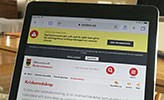Studies within DURCOM
Here, you can explore the studies, book chapters, and reports produced within the project, focusing on various aspects of risk communication and societal preparedness.
-

The municipal experts focus on technical risks
The researchers have examined how municipalities address risks related to climate change and what role they believe citizens should play. The results show that municipal officials primarily focus on technical risks and consider these not to require...
-

A hierarchical structure benefits security officials
Researchers have examined how municipal staff working in security and communication collaborate. The results show that interaction between the two professional groups is limited, and that communication officers have less influence.
-

Challenges for communicators
What challenges do communicators face in risk communication work? The study identifies four overarching tensions. One example is the tension between transparency and confidentiality – how much information can municipalities share with the public when it...
-

A Nordic perspective: Three areas for improvement in municipal risk communication
The study shows, among other things, that municipalities in both Sweden and Norway face challenges in distinguishing between risk communication and crisis communication. The researchers propose three areas for improvement in municipal risk communication:...
-

Information and instructions – opportunities and challenges
How much information are we truly receptive to in a world where we are overwhelmed by media messages and government messages about risks and threats? Two studies – one on risk information and one on instructions – highlight both opportunities and...
-

Digital citizens – what responsibility are we willing to take?
What level of responsibility is the digitally savvy, service-oriented citizen prepared to take? Two studies examine how prepared young adults are to handle crises and how different types of messages influence the extent to which citizens feel a sense of...
-

Use of digital services for risk information occurs mostly during crises
Municipal websites about crisis preparedness receive relatively few visitors, but those who actively seek information are engaged. During a crisis, the demand for both risk and crisis information increases significantly, and public engagement intensifies.
-

An increased focus on individual responsibility in communication
In recent years, individual responsibility and participation in society’s crisis preparedness have been increasingly emphasized in Swedish crisis preparedness policy. This is evident in the communication of both the Swedish Civil Contingencies Agency...
-

An experiment on different messages related to cybersecurity and responsibility
Cyber crises are complex in terms of responsibility and management. In one study, researchers examined how different messages affect the extent to which citizens feel a sense of personal responsibility.
-

Household preparedness campaigns during times of uncertainty engage – but not everyone
Many citizens listen, show interest, and engage in household preparedness in line with the state's recommendations – but not everyone follows authorities blindly. Engagement reflects classic divides related to social background, as well as levels of...
